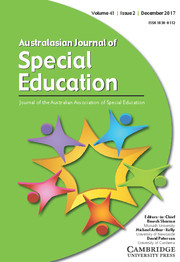Article contents
Teaching Children With Down Syndrome in the Early Years of School*
Published online by Cambridge University Press: 19 July 2017
Abstract
We explored 3 general classroom teachers’ experiences of including a child with Down syndrome in their early years classrooms. Located at 3 different Australian school settings, 1 teacher was the head of a Preparatory class, 1 was a Year 3 teacher, and the third was a teacher of a split Preparatory/Year 1 class. Interview data were drawn from a larger study, in which data were gathered over a 5-month period through class observations and teacher interviews. The findings indicate that although there were highly inclusive experiences identified in the school sites, the school context played an important role in the inclusion of the child. Teachers indicated that receiving targeted information about Down syndrome and collaborative support from parents, teaching colleagues, and their wider school enabled them to work more inclusively with their student with Down syndrome in their classroom.
- Type
- Original Articles
- Information
- Copyright
- Copyright © The Author(s) 2017
Footnotes
This manuscript was accepted under the Editorship of Michael Arthur-Kelly.
References
- 5
- Cited by


